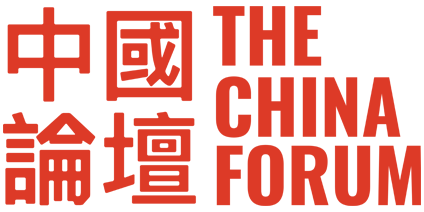China Forum 2024
China Forum is an annual conference in Washington, D.C. convening scholars, experts, and policymakers in the areas of trade and economics, foreign policy and security, and human rights and political development. The goal of China Forum is to help Americans understand the nature of the People’s Republic of China, the Chinese Communist Party, and key issues in U.S.-China relations.
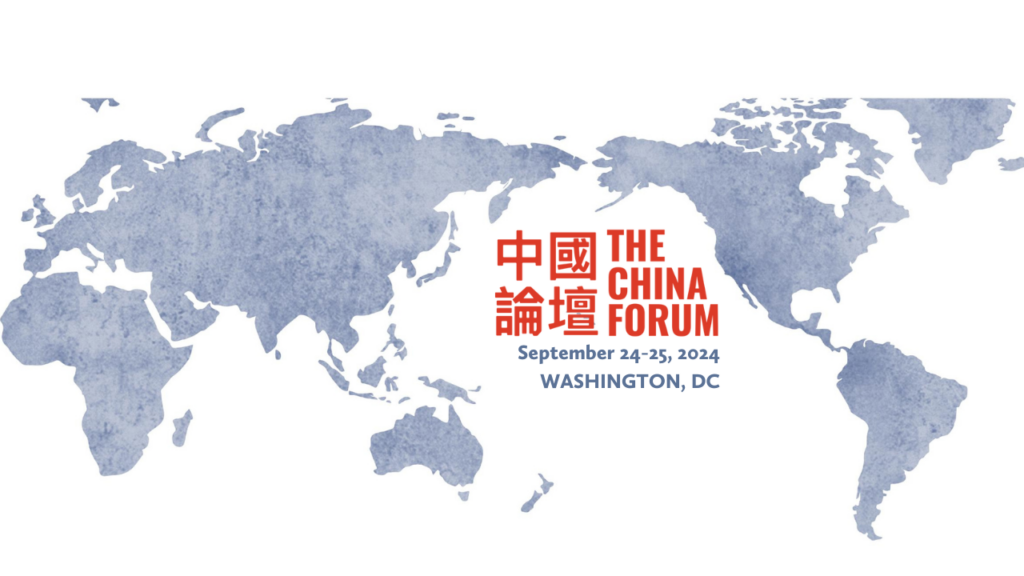
China Forum Agenda 2024
- Tuesday, September 24
Research Presentation with Dr. Adrian Zenz
- 12:00 - 1:00 PM
-
1539 Longworth Building
15 Independence Avenue SE
Washington, D.C. 20003
The 2024 China Forum kicked off with an engaging presentation by Dr. Adrian Zenz, a leading researcher in China’s ethnic policy, Beijing’s campaign of mass internment, securitization and forced labor in Xinjiang, public recruitment and coercive poverty alleviation in Tibet and Xinjiang, and China’s domestic security budgets. Dr. Zenz shared insights from his latest research on developments with Uyghur forced labor and the International Labor Organization (ILO) recently changing their forced labor measurement guidelines.
Film Screening and Panel
- 3:30 – 7:30 PM
-
Victims of Communism Museum
900 15th Street NW
Washington, D.C. 20005
Reception
- 3:30 – 4:00 PM
Welcome Remarks
- 4:00 – 4:05 PM
- Ambassador Andrew Bremberg, President Emeritus, Victims of Communism Memorial Foundation
Opening Remarks
- 4:05 – 4:10 PM
- David Novack, Director, All Static & Noise (virtual)
Film Screening: All Static & Noise directed by David Novack, produced by Janice Englehart
When Uyghurs and Kazakhs are arbitrarily detained in “re-education” camps by Chinese authorities, camp survivors and their families risk everything to expose the truth.
- 4:10 – 5:05 PM
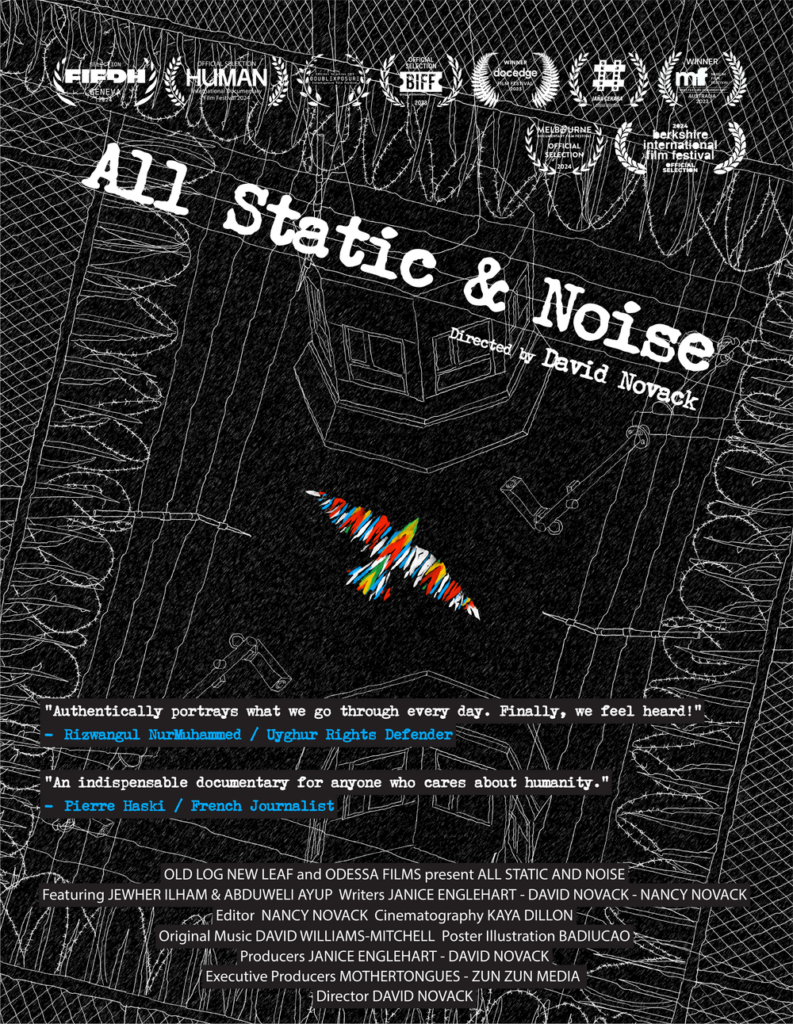
Jewher lands in the United States after authorities arrest her father at the Beijing airport. Abduweli, imprisoned and tortured in China for teaching the Uyghur language, leaves for Istanbul upon his release. Together, they join survivors of China’s “reeducation camps” and their families in Turkey, Kazakhstan, Europe, and the United States to expose atrocities with the hope that global awareness will bring change. This collaboration with the Uyghur diaspora across seven countries creates a powerful film that exposes both the enormity of state-sponsored oppression and the individual struggles under these conditions.
Panel Discussion: Beijing’s Ongoing Repression of the Uyghurs
- 5:05 – 6:05 PM
- Adrian Zenz, Ph.D., (moderator), Senior Fellow in China Studies, Victims of Communism Memorial Foundation
- Rushan Abbas, Executive Director, Campaign for Uyghurs
- Muetter Iliqud, Project Researcher, Victims of Communism Memorial Foundation
- Mihrigul Tursun, Former Re-Education Camp Detainee
Virtual Reality Experience “Inside Xinjiang’s Mass Internment Camps”
Exhibit produced by Uyghur Transitional Justice Database
- 6:05-7:30 PM
- Adiljan Abdurihim, Secretary, Uyghur Transitional Justice Database (virtual)
- Wednesday, September 25
China Forum 2024
- 8:30 AM – 5:00 PM
-
The Mayflower Hotel
1127 Connecticut Avenue NW
Washington, D.C. 20036
Coffee & Registration
- 8:30 – 9:00 AM
Opening Remarks
- 9:00 – 9:10 AM
- Eric Patterson, Ph.D., President and CEO, Victims of Communism Memorial Foundation
- Ambassador Andrew Bremberg, President Emeritus, Victims of Communism Memorial Foundation
- Adrian Zenz, Ph.D., Director and Senior Fellow in China Studies, Victims of Communism Memorial Foundation
Fireside Chat with US Congress Members
- 9:10 – 9:30 AM
- John Moolenaar (R-MI), Chairman, House Select Committee on China
- Raja Krishnamoorthi (D-IL), Ranking Member, House Select Committee on China
- Adrian Zenz, Ph.D., Director and Senior Fellow in China Studies, Victims of Communism Memorial Foundation
Keynote Address
- 9:35 – 10:00 AM
- David Shambaugh, Director, China Policy Program, GWU Elliott School of International Affairs, Distinguished Visiting Fellow, Hoover Institution
Uyghur Forced Labor: Dissecting Beijing’s Systems of Coercive Work for Ethnic Minorities
- 10:00 – 11:25 AM
Beijing’s forced labor schemes targeting ethnic minorities in Xinjiang have been increasingly well documented, tainting global supply chains in major industries from cotton and tomatoes to auto parts and solar. This panel discussed new research on forced labor in Xinjiang and how the ILO’s updated forced labor measurement guidelines squarely target Uyghur forced labor.
- Adrian Zenz, Ph.D., (moderator and presenter), Director and Senior Fellow in China Studies, Victims of Communism Memorial Foundation
- Olivia Enos, Senior Fellow, Hudson Institute
- David Hampton, Deputy Executive Director of Trade Remedy Law Enforcement, Office of Trade, U.S. Customs & Border Protection
- Alicia Hennig, Ph.D., Professor, Dresden Technical University
Human Rights and Diplomacy: Strategies for Holding Beijing Accountable in International Systems
- 11:25 AM – 12:55 PM
China’s quinquennial human rights review at the United Nations in late 2023 and early 2024 illustrated member states’ rising concern about Beijing’s human rights record, lack of transparency, and its co-optation and manipulation of multilateral systems. This panel discussed prospects for concrete actions by UN bodies and member states in the international system, such as public condemnation, coordinated sanctions, Human Rights Council resolutions, fact-finding missions, increased reporting by the Human Rights Commissioner, commissions of inquiry, and diplomatic isolation. Panelists also addressed the role of Muslim-majority countries and faith leaders in pressing Beijing to respect fundamental rights
- Ambassador Andrew Bremberg (moderator), President Emeritus, Victims of Communism Memorial Foundation
- Ambassador Kelley Currie, Senior Fellow, Atlantic Council
- Ambassador Mark Green, President and CEO, Wilson Center
- Sophie Richardson, Ph.D., Visiting Scholar, Stanford Center on Democracy, Development, and the Rule of Law
Luncheon
- 1:00 – 2:00 PM
Finding Cleaner Profits: An Assessment of How Western Businesses are Disentangling from Beijing’s Malign Activities
- 2:00 – 3:20 PM
As companies and consumers grapple with mass forced labor and Beijing’s practices of economic coercion, businesses are reviewing their relationships with China to “de-risk” them from rising consumer outrage, tighter enforcement of ethical standards, and a policy shift towards more robust legislation such as forced labor bans. This panel explored the duties of responsible business and how to convert rules into realities, from outbound investment into China’s capital markets, to supply chain due diligence, to ensuring credible audits, to surveillance and privacy risks from companies like TikTok. Panelists also considered how policymakers and multinationals can take the lead to ensure “clean commerce,” and protect their citizens and consumers from unwitting complicity in human rights atrocities.
- Eric Patterson, Ph.D., (moderator), President and CEO, Victims of Communism Memorial Foundation
- David Feith, Adjunct Senior Fellow, Indo-Pacific Security Program, Center for a New American Security (CNAS)
- Randall Schriver, Chairman, Project 2049 Institute
- Michael Sobolik, Senior Fellow in Indo-Pacific Studies, American Foreign Policy Council (AFPC)
- Liza Tobin, Senior Director of Research and Analysis for Economy, Special Competitive Studies Project
Interview
- 3:20 – 3:45 PM
- Adrian Zenz, Ph.D., (interviewer), Senior Fellow in China Studies, Victims of Communism Memorial Foundation
- Martin Dimitrov, Ph.D., Professor of Political Science, Tulane University
Coffee Break
- 3:45 – 3:55 PM
Crime and Consequence: Pursuing Legal Action on the Xinjiang Atrocity Through International Mechanisms
- 3:55 – 5:25 PM
Amid the failure of the United Nations to create an independent mechanism to investigate Beijing’s crimes in Xinjiang, researchers and civil society are increasingly exploring ways to consolidate, preserve, and analyze documentation of ongoing atrocities, and to pursue legal action to hold the perpetrators to account. This panel outlined strategies for documenting the crimes and those responsible, prospects for legal action such as sanctions and universal jurisdiction cases, and related efforts to raise awareness and push for meaningful action in multilateral settings, including the United Nations. Panelists also disected Beijing’s efforts to thwart documentation efforts, silence witnesses, and co-opt global human rights accountability mechanisms.
- Danica Damplo (moderator), Policy Manager, United States Holocaust Memorial Museum (USHMM)
- Muetter Iliqud, Project Researcher, Victims of Communism Memorial Foundation
- Ambassador Stephen Rapp, Former US Ambassador-At-Large for Global Criminal Justice
- Ambassador Morse Tan, Former US Ambassador-At-Large for Global Criminal Justice
Closing Remarks
- 5:25 – 5:30 PM
- Ambassador Andrew Bremberg, President Emeritus, Victims of Communism Memorial Foundation
China Forum 2022
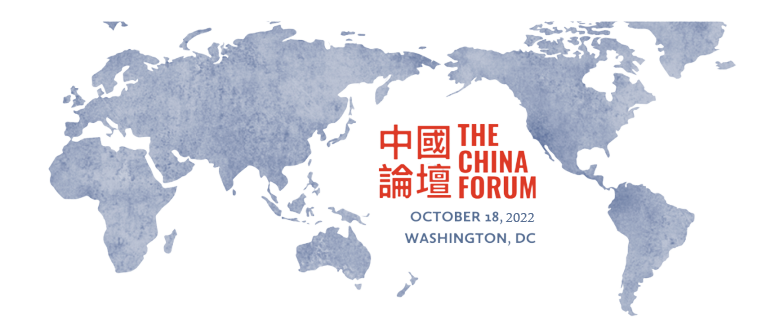
- TUESDAY, DECEMBER 5
In Search of My Sister Film Screening
Filmed in over a dozen countries, “In Search of My Sister” is a story of an American Uyghur Activist whose sister is one of 1.8-3 million Uyghurs taken by the Chinese Communist Party. She embarks on a journey to create awareness and find clues to the whereabouts of her missing sister.
- 9:00 AM - 5:00 PM
- Victims of Communism Museum 900 15th Street NW Washington, D.C. 20005
- TUESDAY, DECEMBER 6
China Forum 2022
- 9:00 AM - 5:00 PM
- 1127 Connecticut Avenue, NW Washington, D.C. 20036
Welcome Remarks
- 9:00 AM
- Amb. Andrew Bremberg, President, Victims of Communism Memorial Foundation
Uyghur Forced Labor and Prevention: New Trends in Coercive Labor and the Duties of Business
- 9:00 AM
NOTE: This panel will adhere to Chatham House rules. The discussion will be off-the-record and will not be live-streamed.
In June 2022 the United States banned the import of all goods linked to Xinjiang due to the region’s systematic, state-sponsored forced labor systems, through the Uyghur Forced Labor Prevention Act (UFLPA). Recently Xinjiang has embarked on a program to deepen the reach of forced labor through increased full employment requirements. Which goods and sectors can be implicated in forced labor? How has enactment of the UFLPA, and the enforcement measures applied to date, impacted US-China supply chains? Can the Act effectively contain the import of goods whose production is linked to Xinjiang, or are Chinese businesses successfully avoiding the ban? Can supply chain regulations catch up with the evidence? This panel will also address business due diligence issues such as how Xinjiang companies may be evading sanctions, supply chain risks related to intermediary countries especially in Asia, and how the business community is responding amid these developments.
- Irina Bukharin, Program Director for Human Security, Center for Advanced Defense Studies
- John Foote, Partner, Kelly Drye & Warren LLP
- Shelly Heald Han, Chief of Staff and Director of Engagement, Fair Labor Association
- Virginia Wake, International Trade Specialist, Forced Labor Division, U.S. Customs and Border Protection
- Adrian Zenz, Director and Senior Fellow in China Studies, Victims of Communism Memorial Foundation (moderator)
Beginning of Public Livestream
Opening Remarks
- 10:40 AM
- The Hon. Edwin J. Feulner, Ph.D., Chairman, Victims of Communism Memorial Foundation
- Ambassador Andrew Bremberg, President, Victims of Communism Memorial Foundation
- Adrian Zenz, Director and Senior Fellow in China Studies, Victims of Communism Memorial Foundation (moderator)
Keynote Address
- 10:55 AM
- Daniel Tobin, China Studies Faculty, National Intelligence University
Entanglement and Dependencies: Addressing the Challenges of Economic Integration With China
- 11:20 AM
Beijing has leveraged China’s economic power and integration with global markets to expand its global influence and reduce criticism of its human rights violations. Business relationships with China increasingly implicate rights-respecting countries and companies in Beijing’s human rights abuses, military modernization, and surveillance state. This panel will discuss the moral and strategic costs of doing business with China, the challenges of disentangling from problematic financial ties, and explore approaches toward strategic forms of decoupling from related entanglements.
- Claire Chu, Senior Analyst, Janes Group
- The Hon. Nazak Nikakhtar, Partner, Wiley Law
- Michael Sobolik, Fellow in Indo-Pacific Studies, American Foreign Policy Council
- Ana Swanson, Trade and International Economics Writer, New York Times (moderator)
Global Governance: World Order With Chinese Characteristics?
- 10:45 AM – 11:45 AM
- Peter Mattis, Director of Research and 123Analysis, Special Competitive Studies 123Project
- David Sauer, Retired CIA Officer Miles Yu, Ph.D., Professor of History, 123U.S. Naval Academy
- Amb. Andrew Bremberg, President and CEO, 123Victims of Communism Memorial 123Foundation (moderator)
Luncheon
- 12:40 PM – 1:40 PM
Chains of Command: Beijing’s Policymaking on Xinjiang and the Direction of Ethnic Policy Under Xi Jinping
- 1:40 PM
Internal documents from the leaked “Xinjiang Papers” and hacked “Xinjiang Police Files” shed unprecedented new light on the nature, scale, and driving forces behind Beijing’s campaign of mass internment. This panel will discuss what the latest evidence reveals about Beijing’s increasingly draconian ethnic policies in particular in Xinjiang, including their genesis and development, their nature and intent, the extent of central government involvement, and their future direction under Xi Jinping. It will discuss the latest developments in ethnic policy for sensitive groups such as Uyghurs or Tibetans, and assess how unprecedented developments in Xinjiang may be influencing policies in other sensitive ethnic regions.
- James Millward, Professor of Intersocietal History, Walsh School of Foreign Service, Georgetown University
- Sean Roberts, Professor of the Practice of International Affairs, Elliott School of International Affairs, George Washington University
- Suisheng Zhao, Professor and Director, Center for China-US Cooperation at Josef Korbel School of International Studies, University of Denver
- Adrian Zenz, Director and Senior Fellow in China Studies, Victims of Communism Memorial Foundation (moderator)
Interview and Q&a Session
- 3:00 PM
- Cai Xia, Editor-in-Chief, Yibao magazine
- Adrian Zenz, Director and Senior Fellow in China Studies, Victims of Communism Memorial Foundation (interviewer)
Global Ambitions: Beijing’s Foreign Policy and Power Projection
- 3:30 PM
Under Xi Jinping, Beijing’s foreign policy has taken a coercive turn, and its attempts to influence global norms and institutions in line with its global ambitions have become more overt. China’s economic coercion toward other countries, unprecedented military aggression towards Taiwan, and quiet backing of Putin’s land war Ukraine have amplified existing concerns over the ascending superpower’s role within the global community. What are the implications for international relations? What is needed to defend and strengthen a rules-based global order? This panel will assess China’s means of power projection and explore research-driven counter-strategies and responses.
- Michael Auslin, Payson J. Treat Distinguished Research Fellow in Contemporary Asia, Hoover Institution
- Emily de La Bruyère, Co-Founder, Horizon Advisory
- Craig Singleton, China Program Deputy Director and Senior Fellow, Foundation for Defense of Democracies
- Ambassador Andrew Bremberg, President, Victims of Communism Memorial Foundation (moderator)
Closing Remarks
- 4:50 PM
- Amb. Andrew Bremberg, President, Victims of Communism Memorial Foundation
China Forum 2021
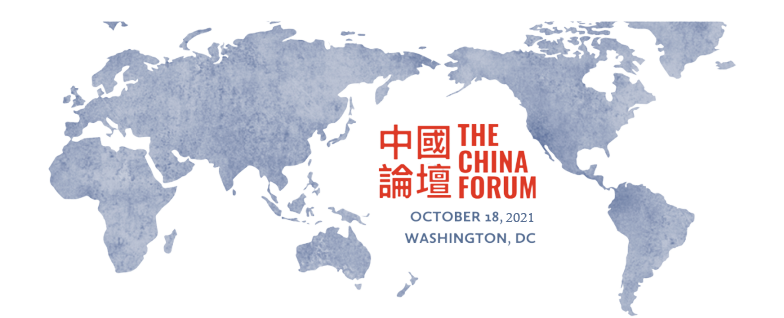
China Forum Agenda 2021
- WEDNESDAY, OCTOBER 27
China Forum 2021
- 9:00 AM - 3:30 PM
- Victims of Communism Museum 900 15th Street NW Washington, D.C. 20005
Opening Remarks
- 9:00 AM – 9:45 AM
- Amb. Andrew Bremberg, President, Victims of Communism Memorial Foundation
- Edwin J. Feulner , Ph.D., Chairman, Board of Trustees, Victims of Communism Memorial Foundation
- Michael Pillsbury, Ph.D., Senior Fellow and Director for Chinese Strategy, Hudson 1 Institute
Technology, Authoritarianism, and Big Tech’s Compliancy
- 9:45 AM – 10:45 AM
- Emily de La Bruyère, Co-Founder, Horizon 123Advisory
- Ian Easton, Senior Director, Project 2049 123Institute
- Nathan Picarsic, Co-Founder, Horizon 123Advisory
- Adrian Zenz, Ph.D., Senior Fellow and 123Director, China Studies, Victims of 123Communism Memorial Foundation 123(moderator)
Global Governance: World Order With Chinese Characteristics?
- 10:45 AM – 11:45 AM
- Peter Mattis, Director of Research and 123Analysis, Special Competitive Studies 123Project
- David Sauer, Retired CIA Officer Miles Yu, Ph.D., Professor of History, 123U.S. Naval Academy
- Amb. Andrew Bremberg, President and CEO, 123Victims of Communism Memorial 123Foundation (moderator)
China’s Frontiers: The Ccp and Colonial Legacies
- 11:45 AM – 12:45 PM
- Bhuchung Tsering, Interim President, 123International Campaign for Tibet
- James Millward, Ph.D., Professor of Inter- 123societal History, Walsh School of Foreign 123Service, Georgetown University
- Jeffrey Ngo, Hong Kong Activist Historian and 123Ph.D. Candidate, Georgetown University
- Olivia Enos, Senior Policy Analyst in the Asian 123Studies Center, The Heritage Foundation 123(moderator)
LUNCHEON
- 12:45 PM – 1:30 PM
Supply Chain and Forced Labor
- 1:30 PM – 2:30 PM
- Allison Gill, Forced Labor Director, Global 123Labor Justice International Labor Rights 123Forum
- Michael Sobolik, Fellow in Indo-Pacific Studies, 123American Foreign Policy Council
- Adrian Zenz, Ph.D., Senior Fellow and Director,123China Studies, Victims of Communism 123Memorial Foundation
- Ethan Gutmann, Research Fellow in China 123Studies, Victims of Communism Memorial 123Foundation (moderator)
Finance: The Myth of Chinese Financial Hegemony
- 2:30 PM – 3:30 PM
- William Browder, CEO, Hermitage Capital 123Management
- Dexter Roberts, Senior Fellow, Atlantic 123Council
- Roger Robinson, President and CEO, RWR 123Advisory Group
- Jillian Melchior, Writer, Wall Street Journal 123(moderator)
Closing Remarks
- 3:30 PM
- Amb. Andrew Bremberg, President, Victims of Communism Memorial Foundation
